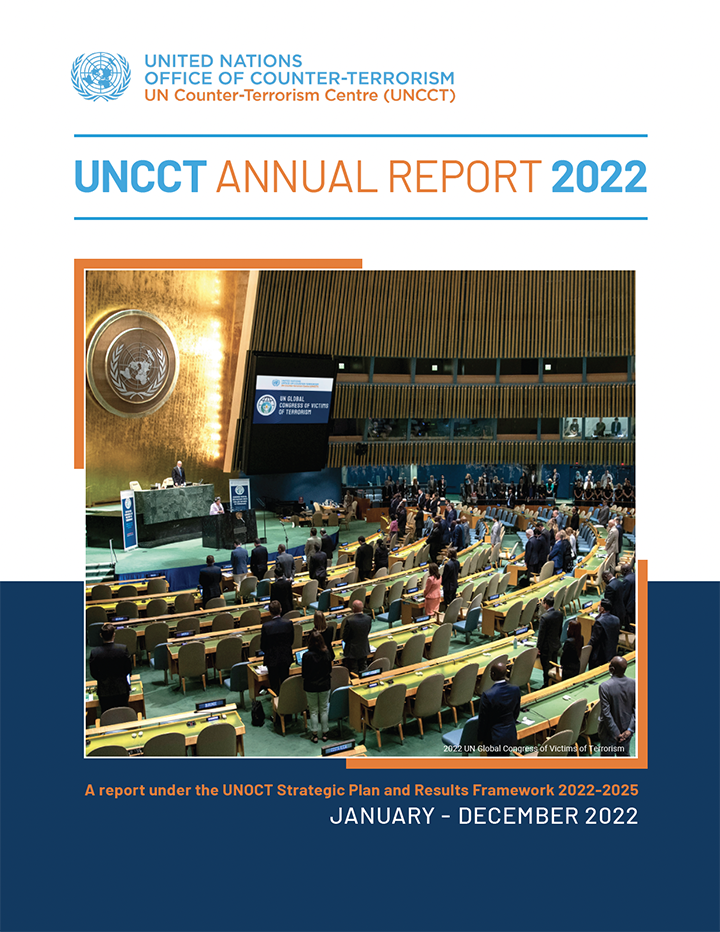Criminal justice measures
“We need a strong partnership that brings together all stakeholders to prevent our communities from sinking into extremism and radicalization. We all have a role to play. The United Nations remains committed to responding to this challenge and will move with G5 countries to help build a region where hope, peace and inclusion can prevail.”
-- Under-Secretary-General Vladimir Voronkov, Head of the United Nations Office of Counter-Terrorism
Increasing levels of insecurity in the Sahel region
This UNCCT project, focusing on Strengthening Rule of Law-Based Criminal Justice Measures and Related Operational Measures against Terrorism and Violent Extremism, runs in the Sahel region. The terrorist threat in the Sahel has been growing after Al Qaeda in the Islamic Maghreb (AQIM) seized northern Mali in 2012, in spite of subsequent AQIM setbacks. This region already witnessed increasing levels of insecurity due to Al-Qaida-affiliated terrorist groups operating and the deterioration of the security situation in Libya, adding to the challenges posed by Boko Haram’s enduring threat and new inroads into the Sahel.
The porosity of the borders of the Sahel countries further compounds criminal activities linked to trafficking and cross-border crimes. Wide-scale poverty and unemployment in the Sahel have further become driving factors that lure many young men especially, to join the terrorist groups and criminal networks.
Foreign terrorist fighters
Additionally, the risk of foreign terrorist fighters (FTFs) converging towards the Sahel due to ongoing global events in the Middle East, weak governments, porous borders and the presence of terrorist groups is high. Al Qaeda (AQ) and Islamic State (IS) affiliates active in the Sahel represent an attractive opportunity for returning FTFs to use their combat and recruitment experience to serve the cause of terrorist groups.
The combination of returning FTFs and the rapid degradation of the security environment, including an intensification of the Malian conflict’s spillover towards northern-Burkina Faso, the potential opening of a new “front” located between the borders of Burkina Faso, Mali and Niger, as well as the potential westward movement of Boko Haram should result increased training assistance for law enforcement and criminal justice components in the Sahel.
Given the current prevention-, investigation- and prosecution-related challenges faced by G5 Sahel countries (backlogs, limited capacity, inadequate training, risk of human rights violation, etc.), the ongoing degradation of the security environment could lead to excessive stress on national and regional institutions further exacerbating or creating new sources of socio-political instabilities and worsening the already precarious humanitarian situation while potential bolstering transnational criminal activities within and beyond the Sahel.
The latest developments in Sahel countries, especially those linked to AQIM, IS and Boko Haram, highlight the importance of continuing the provision of assistance to those countries to strengthen their criminal justice responses to terrorism, with a special focus on the G5 Sahel countries.
Project’s mandate
The global response to terrorism requires a broad range of short-term and long-term initiatives. These include rule of law-based and human rights compliant criminal justice measures against terrorism, to prevent acts from being committed and to bring those partaking in terrorism-related activities to justice.
Pursuant to UN Security Council Resolution 2195 (2014), and S/PRST/2015/24, which encourages UNOCT to extend its Integrated Assistance for Countering Terrorism (I-ACT) to the G5 Sahel, UNOCT supports the G5 Sahel particularly in the areas of criminal justice, border security management, and prevention of radicalization and violent extremism. I-ACT aims to support requesting governments and regional organizations in their implementation of the UN Global Counter-Terrorism Strategy at the national and regional level in a coordinated and coherent manner.
Project's activities
Key deliverables of the Strengthening Rule of Law-Based Criminal Justice Measures and Related Operational Measures against Terrorism and Violent Extremism project include:
- Capacity-building support to strengthen criminal justice and law enforcement officials’ ability to build terrorism cases
- The operationalization of judicial cooperation within G5 countries through a partnership with the Sahel Platform
- Network of specialized counter terrorism units in the Sahel
To achieve these key deliverables UNCCT together with UNODC organize:
- National training workshop on building terrorism cases for investigators, prosecutors and investigating judges
- Mentoring session for the magistrates of the specialized CT judicial pole to provide tailored advice on building solid terrorism cases
- The first sub-regional meeting of the specialized counter-terrorism judicial and investigative units for the establishment of a regional network
- National training workshop on witness protection for investigators, prosecutors, and investigating judges in charge of terrorism cases
- High-level meeting that results in a MOU between the Sahel Platform and the G5 Sahel to support the operationalization of judicial cooperation
- The first sub-regional workshop of the integrated structure between the Sahel Platform and the G5 Sahel
Through these activities, the Centre will seek to increase and operationalize regional judicial cooperation and strengthen the capacity of criminal justice and law enforcement officials of the G5 Sahel countries to build terrorism cases.
Project’s coordination role
The Integrated Assistance for Countering Terrorism (I-ACT) for the G5 Sahel is implemented within the Framework of the UN Integrated Strategy for the Sahel (UNISS). The regional I-ACT capacity building framework for the G5 Sahel includes regional, strategic, mutually reinforcing, gender-and-human-rights sensitive projects implemented by UN Women, UNESCO, UNODC, and UNOCT/UNCCT in close cooperation with UNOWAS and the G5 Sahel Permanent Secretariat.
Project's impact
Examples of UNCCT’s Strengthening Rule of Law-Based Criminal Justice Measures and Related Operational Measures against Terrorism and Violent Extremism project include:
- By responding to pressing capacity-building needs, the project enables investigators, prosecutors and investigating judges in charge of terrorism cases in Burkina Faso how to better protect witnesses, and make the same professionals in Mauritania better able to effectively build a terrorist conspiracy case.
- The project will help the G5 Sahel strengthen judicial cooperation between its member states, building on the already existing Sahel Platform.
- It will foster mutual learning between law enforcement and justice agencies specialized in terrorism cases in G5 Sahel countries, through the establishment of a network of these units.


